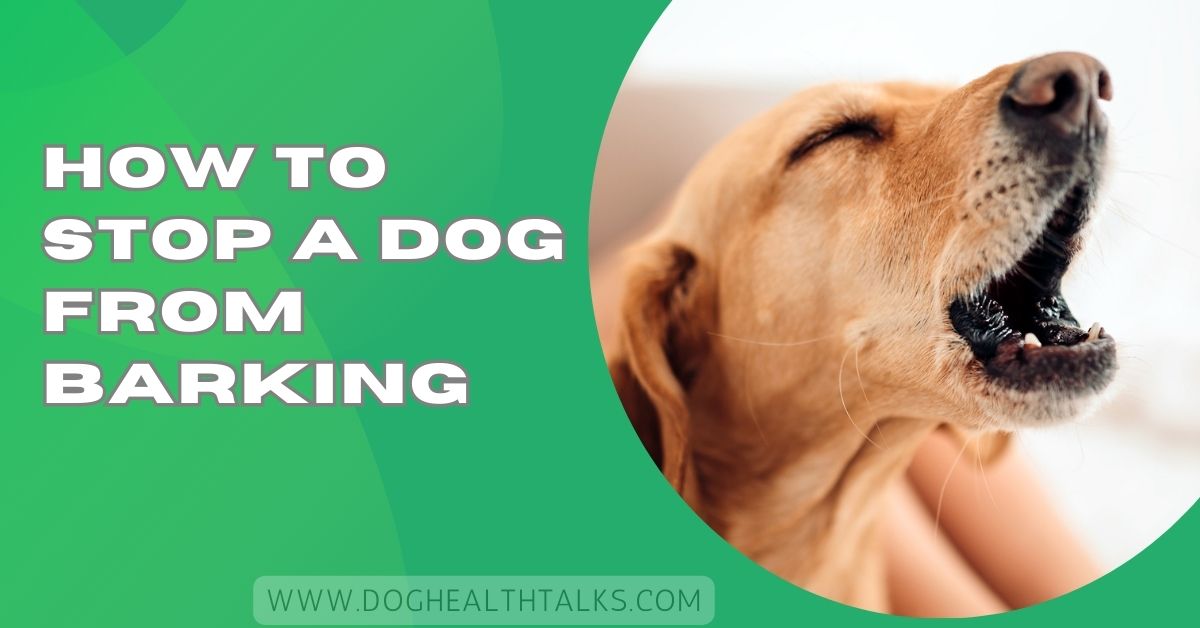How to Stop a Dog From Barking: Don’t Miss Proven Quiet!
Barking is a natural way for dogs to communicate, but when it becomes nonstop, it can test even the most patient owner.
To stop a dog from barking, use positive reinforcement, teach the “quiet” command, give exercise, limit triggers, and reward calm behavior. Avoid reinforcing barking, never punish, and seek professional help if barking continues.
This guide will help you understand why dogs bark and show you simple, practical steps to bring more peace to your home—without harming your bond.
Why Do Dogs Bark?
Dogs bark to communicate feelings or needs—some bark when excited, others when scared, bored, or seeking attention.
Barking can also warn you of strangers, protect territory, or express frustration. Sometimes it’s just playfulness.
To reduce excessive barking, it’s important to look deeper—ask yourself if your dog needs exercise, comfort, or reassurance. Understanding the reason behind the noise is the first step to fixing it.
How To Stop a Dog From Barking

1. Management
The easiest way to reduce barking is by managing your dog’s surroundings. Block outside views with curtains or window film if passing people trigger them.
Play white noise or calming music to cover sounds. Make sure your dog gets enough food, water, play, and bathroom breaks before barking even starts. When their basic needs are met and triggers are minimized, they feel calmer and bark less.
2. Use Positive Reinforcement
Rewarding silence is more effective than punishing noise. When your dog stays calm, offer a treat, praise, or playtime.
If someone knocks at the door, wait until the dog stops barking, then reward that quiet moment.
Over time, they’ll learn good things happen when they’re calm. Positive reinforcement makes training safe, builds trust, and turns barking control into a rewarding habit your dog actually enjoys learning.
Also Read: How Much Baby Aspirin Can I Give My Dog: Vet Advice Inside
3. Teach a ‘Quiet’ (Calm) Verbal Cue
Training your dog with a “quiet” cue takes patience but works well. Start by waiting for a short pause in barking, calmly say “quiet,” then reward with a treat.
Repeat this until they link the word with silence. Gradually use the cue when barking begins. Always stay calm and avoid yelling—dogs respond best to gentle, consistent training that shows them peace is more rewarding than noise.
What You Shouldn’t Do
1. Don’t Reinforce Attention-Seeking Barking
If your dog barks to get your attention, giving in only teaches them that noise works. Instead, wait until they’re quiet before responding.
For example, don’t open the door when they bark—open it when they sit calmly. This way, your dog learns patience is rewarded, not loud demands. Ignoring the barking and rewarding silence is a safe, simple fix that prevents bigger behavior problems later.
2. Never Punish Your Dog
Punishing barking with yelling, spraying water, or shock collars may stop it for a moment, but often makes things worse.
Fear and stress can increase barking and even lead to aggression. Your dog isn’t being “bad”—they’re trying to communicate.
The safe way forward is patience, management, and reward-based training. Avoid punishment, focus on teaching calm behaviors, and you’ll build trust while fixing the barking problem long-term.
Should I Use an Anti-Dog Barking Device?

Anti-barking devices like shock collars or citronella sprays may seem like a quick fix, but they often cause more harm than good.
These tools can create fear, stress, or even aggression without solving the real reason your dog is barking.
A safer, proven approach is using positive reinforcement, daily exercise, and mental stimulation. These methods build trust, reduce barking naturally, and keep your dog happy and healthy.
How To Prevent Dog Barking
- Exercise daily – Long walks, play sessions, and activities help burn off excess energy.
- Engage the mind – Use puzzle feeders, training games, or new toys to prevent boredom.
- Stick to routines – A predictable schedule makes dogs feel secure and less anxious.
- Limit triggers – Close curtains, add privacy film, or use calming background sounds.
- Reinforce calmness – Praise and reward your dog when they stay quiet.
- Meet basic needs – Ensure fresh water, meals, and potty breaks are consistent.
How To Stop A Dog From Barking At Strangers
Keep greetings calm and controlled. Ask strangers to ignore your dog until they settles, then reward quiet behavior.
Slowly expose your dog to new people using treats and praise. Patience and consistency build trust, making them feel safe instead of defensive.
Read Out: Why Is My Dog Coughing? – Top Reasons Explained 2025 Guide
How To Stop A Dog From Barking At People
Teach your dog to focus on you when people pass by. Use treats, praise, and calm redirection.
Avoid scolding, as it can make barking worse. With practice, your dog learns people aren’t a threat, and staying calm is more rewarding.
How To Stop A Dog From Barking At Everything
Dogs bark at noises or movement when overstimulated—limit triggers by closing blinds, using white noise, and keeping them engaged with toys or training.
Redirect attention to you with treats and rewards, so they learn that calm behavior is more effective than constant barking.
How To Stop A Dog From Barking In A Crate
Make the crate a safe, positive space with toys, blankets, and rewards. Avoid letting your dog out while barking, so they don’t think noise earns freedom. Instead, wait for quiet moments to reward, teaching patience and calmness inside the crate.
How To Stop A Dog From Barking At Other Dogs
Maintain distance initially, and reward calmness when other dogs appear. Use commands like “look at me” to redirect focus.
Over time, gradually reduce the space as your dog learns polite behavior. Consistency and positive reinforcement replace barking with calm social skills.
How To Stop A Dog From Barking When You Leave
Practice short departures to teach your dog that you’ll return. Leave a safe toy, chew, or calming music for distraction.
Don’t make departures dramatic—keep them low-key. Over time, your dog feels secure alone, reducing anxiety-driven barking when you step out.
How To Stop A Dog From Barking All The Time

First, find the cause—boredom, attention-seeking, or anxiety. Meet daily exercise and mental needs with walks, play, and puzzles.
Reward calmness instead of noise. Avoid yelling, which feels like joining in. Balanced routines help quiet excessive barking naturally and consistently.
How To Stop A Dog From Barking In An Apartment
Block outside triggers with curtains or white noise. Give your dog daily exercise to reduce the energy that fuels barking.
Teach “quiet” using treats and reward calmness. Respectful training creates peace for you, your dog, and neighbors in close apartment spaces.
Must Read: Can Dogs Eat Slim Jims – Vet-Approved Guide for Pet Owners
How To Stop A Dog From Barking At Neighbors
Teach your dog calm behavior by rewarding silence when neighbors pass or talk. Block visual triggers with a fence or blinds.
Stay consistent, never reward barking with attention. Over time, your dog learns neighbors aren’t threats and quietness is rewarded.
How To Stop A Dog From Barking At Cars
Cars can excite or scare dogs. Start at a distance, rewarding calmness when vehicles pass. Slowly move closer as your dog learns to relax.
Keep walks structured, and redirect attention with commands or treats. Consistent practice reduces car-related barking.
How To Stop A Dog From Barking When Alone
Provide safe toys, chews, or puzzle feeders to keep your dog busy. Use background sounds, such as soft music, to reduce feelings of loneliness.
Start with short absences and reward calm behavior. Gradually building independence teaches your dog to stay quiet when alone.
How To Stop A Dog From Barking At Guests
Set boundaries before guests arrive. Ask visitors to ignore your dog until it is calm. Use treats and praise to reward silence.
Keep greetings low-energy, avoiding excitement that fuels barking. With consistency, your dog learns that being quiet gets attention.
How To Stop A Dog From Barking Excessively
Excessive barking often signals unmet needs. Ensure enough exercise, play, and mental challenges daily. Train “quiet” with rewards when barking stops.
Avoid punishment—it increases stress. A balanced routine, patience, and positive reinforcement help manage and reduce constant barking effectively.
How To Stop A Dog From Barking At Night
Night barking often comes from boredom, noises, or anxiety. Ensure your dog’s needs—food, water, bathroom—are met before bedtime.
Provide a comfortable sleeping spot and use white noise to block sounds. Calm routines and consistent training reduce nighttime barking naturally.
How To Stop Dog Barking In Seconds
Interrupt barking by calmly redirecting attention with a command like “sit” or “look.” Reward silence immediately so your dog learns quietness pays.
Stay consistent—quick, calm redirection paired with rewards is the fastest way to stop barking in the moment.
My Dog Barks At Everything That Passes By
Limit what your dog sees by closing blinds or using frosted windows. Teach them to focus on you instead of outside movement.
Reward silence when triggers appear. With consistency, your dog learns that staying calm is more rewarding than constant barking.
How To Stop A Dog From Barking In The House

Create a calm indoor environment. Block common triggers, provide toys, and give plenty of exercise. Redirect barking with a “quiet” cue, rewarding silence.
Avoid shouting, as it adds to the noise. Consistency and calm reinforcement teach your dog to stay peaceful inside.
How To Stop A Dog From Barking On Walks
Keep walks structured with a steady pace. Redirect your dog’s focus when triggers appear using treats or cues like “look at me.”
Avoid pulling on the leash, as this adds unnecessary tension. Reward calm walking to replace barking with relaxed outdoor behavior.
Cesar Millan: How To Stop A Dog From Barking
Cesar Millan focuses on exercise, discipline, and affection in that order. He recommends daily physical activity, calm but firm leadership, and consistent training to guide behavior.
Meeting a dog’s mental and physical needs reduces excess energy, helping control unwanted barking naturally.
FAQs
1. How do you stop nuisance barking?
Identify the cause, redirect attention, and reward calmness. Consistent training, exercise, and avoiding reinforcement help stop nuisance barking.
2. What is the 3 bark rule?
The 3 bark rule means allowing three warning barks, then calmly redirecting or rewarding silence, teaching controlled, respectful communication.
3. What is the best remedy for a barking dog?
The best remedy is exercise, mental stimulation, and positive training. Meeting needs prevents boredom barking and encourages calmer, quieter behavior.
4. What sound silences a dog from barking?
A calm “quiet” cue, clicker, or gentle clap paired with rewards helps silence barking and trains your dog to respond quickly.
5. Can dogs be trained not to bark?
Yes, dogs can be trained to bark less. With consistent reinforcement, redirection, and patience, they learn that calmness is more rewarding.
Conclusion
Stopping a dog from barking doesn’t mean silencing their voice—it means teaching calm, confident behavior. With patience, consistency, and positive reinforcement, you can transform noisy habits into peace. Focus on exercise, training, and trust-building. Remember, every dog can learn with love, and every owner can enjoy a calmer, happier home.






